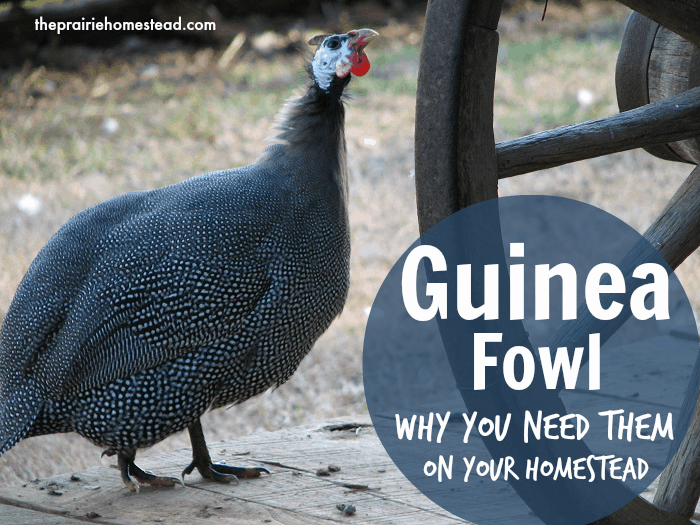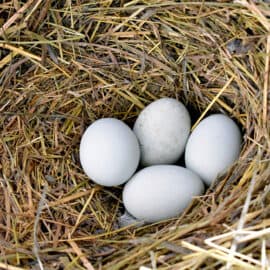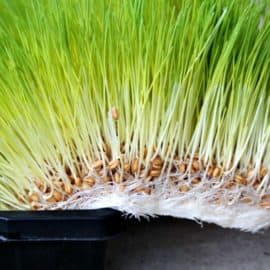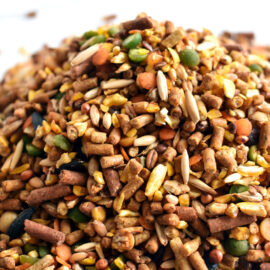Today I’m learning just as much as you are! I’ve often wondered about raising guinea fowl, but have not yet taken the leap. After reading this post by Charles of The Chicken Review blog, I’m ready to bring home some guinea keets from the feed store next spring. I think they’ll make the perfect addition to our homestead–especially as snake repellent! Read on as Charles shares the scoop on why you need guineas on YOUR homestead—->
The guinea hen is often referred to as a guinea fowl. This unique bird is not native of the United States but actually comes from Africa, south of the Sahara.
The helmeted or domesticated guinea hen is a larger species than other guineas. This particular guinea fowl weighs almost 3 lbs. This is the common guinea we find here in the USA, and it displays grey body plumage sprinkled with small, white spots. This domesticated Guinea does not fly well, but is very apt at running and they are very fast. Their flight is a short glide and they are running upon touching the ground.
I still remember being raised around this unique bird and finding it was one of the hardest creatures ever to sneak up on! Our next door neighbor owned a good-sized farm and raised these birds, along with hundreds of chickens. They had a large, long chicken house and the chickens and guineas would all roost together. I was never able to to go to their home without the guineas announcing my arrival.
Here are a few reasons why you should consider adding guineas to your homestead:
The Benefits of Owning Guinea Hens
- Guineas are excellent free range birds
- They provide excellent bug control
- Guineas are talented at catching small snakes and small rodents
- Guineas give loud warnings when they spot a stranger or predator
- Guineas will consume about 90% of their food when free ranging
- Guineas will not scratch up your garden seed like chickens do
(Jill: I’ve always heard that Guineas were excellent at keeping snakes away from the barnyard! I’ve been wanting to get some for that very reason… And the idea that they won’t destroy your garden is appealing as well…)
Similarities of the Guinea Hen to Chickens
- Guineas need shelter, especially during the winter months
- You’ll need to feed them a ration, like you do your chickens (Although not as much if they free range)
- They lay eggs that you can eat
- Guineas are excellent meat birds (Many say better than chicken)
Although chickens are a good natural bug eliminator, guineas are even better! With a keen eye and lightning-fast peck, they will clean up ticks, fleas, and mosquitoes. The diet of a guinea hen will consist of small animals and plants such as seeds, fruit, greens, small mammals, lizards, small snakes, frogs, worms, insects, spiders, etc! They are a wonderful clean-up crew.
Interestingly, the guinea hen is not a very good mother. They are known to abandon the nest and allow the eggs to spoil. The incubation period for the guinea hen is 26 -28 days, a little longer than the chicken who incubates in approximately 21 days. The guinea offspring are called keets. The male species are very aggressive toward one another and will fight often.
The one setback to raising guinea fowl? They are LOUD! They make a very loud high pitched harsh call when they are disturbed. They are some of the finest watch animals ever. Our neighbor never needed a dog during the day time as long as they raised guineas.
So, if you are thinking about owning Guinea’s remember:
- They are loud and can disturb your neighbors
- Guineas are more adapted to free range than most chickens. They are actually easier to take care of than chickens as they are great free range birds.
- If left to free range, they usually have less diseases than chickens do.
- They rarely stay within their property lines. If not fenced in a yard, they will wander over on your neighbor and have to be trained to stay home by your feeding them. They love to roam for their feed. It is in their nature to do so.
Guineas are loved by many types of people and if you ask the owners why they have them the answers may vary a bit! Some keep them to ward off snakes, some to be a bug and pest relief, some to work the garden and keep the beetles and such cleaned off the crop. Guinea are a very useful fowl in the right environment and can be a joy to watch.
So, are you ready to get some Helmeted Guinea Hens? If you live in the open, own a garden or out on a farm, they might just be a perfect fit for you!
My name is Charles and I am the owner of the Chicken Review Blog where we posts articles on chicken breeds, health, coops, incubators, feed, etc. I was born and raised in Southeastern Kentucky and many of us raised much of our own food including chickens and guineas. My wife Sandra and I have been writing for our web sites since January 2013. We love the simple country life and all the pleasures it affords.






Excellent information. I knew they were loud which is okay as long as they pipe down after dark. I did NOT know they were from Africa. That’s very interesting. I’d like to know how they came to America in the first place. I also didn’t know they were lousy mothers so, an incubator is a must I’m guessing. What’s the size of their egg compared to a chicken keeping in mind they’re different sizes too. I enjoyed the read.
They’re eggs are a little smaller than the size of a chickens. When they hatch, they look like a very small turkey!
Thanks for your reply about the eggs. Haha…..wonder if they’d keep ticks off my Bloodhound.
If the bloodhound would let them, I am sure they would eat the ticks right off of him. That is how they live in Africa. They live with larger animals, like the Rhino and keep them free of bugs while the Rhino protects them of predators.
They have eggs the size of an average bantam hen.
I love this article. Thank you for sharing. My husband and I live on ten acres in Texas. I’ve been trying to convince my hubby to let me get some Guinea hens and he kept refusing being he remembers them being so loud. I’ve been wanting them because of the reputation of being the best bug repellent. I didnt realize they eat all the other pests that you posted. So now my husband is agreeing to get us some keets. Thank you again for sharing.
Our neighbors have guineas! They used to have quite a few of them, but, they have been taken by predators, so they only have one left. It often flys over our fence and can’t figure out how to get back over! Makes me laugh. They are loud, but they also are great for keeping ticks and such at bay!
Maybe you could suggest the neighbor clip one of its wings so it stays on the right side of the fence?
Clipping flight feathers will endanger the birds. Predation is a problem for the GF.
Jill thank you so much for this post! I have been toying with the idea of Guinea Hens. We have a bad tick problem and snakes so this may be perfect solution.
Guinea fowl are great for keeping predators at bay, not foolproof, but we have watched ours chase a fox out of the yard and they always run off strange dogs. We only have guinea cocks now as our hens would nest in the tall weeds therefore making them vulnerable to predators.
Funny you post this today since we have been talking seriously about picking some up at our next farm swap! I knew they were good guard dogs and ate ticks and fleas(one of our biggest problems with 4 dogs) but I didn’t know about the snakes! Good to know since we have a variety here in Florida!
I can attest that they do taste better than chicken – but I’m not sure I want to raise them. They are pretty obnoxiously loud, and if they ARE free range, they can be hard to control or train to lay in nesting boxes.I also didn’t notice this article mentioning that the eggs are quite a bit smaller than chicken eggs – something to consider, especially if you do need to end up feeding them a bit to keep them tamer.
Is there an issue with males getting along with roosters?
We had guineas on our farm in Alabama. When they say they are LOUD – that doesn’t do them justice. They are incredibly LOUD and they never shut up. We had a 6 foot fence around our 1/2 acre chicken run and coop area that didn’t even come close to containing them. They never went into the chicken coop with the chickens at night. They just found the nearest tree and flew up there. Since they were completely uncontainable we lost all of them to predators within 6 months. We tried again the next season and lost 20 more before we gave up. To keep them successfully, you would need a fully enclosed run, which would defeat the purpose of free-ranging tick-eating birds! i would never get them again.
20 years ago we had guineas, a turkey (male), geese, and chickens.They all free ranged on an acre or two. The chickens and guineas roosted in the chicken house with no problems. Had males in all of the flocks and NEVER saw fighting between the males. Opened the chicken house each morning and let all that were in out. The chickens would run where ever they wanted. The guineas had a path that they ranged on all around the cleared area at the forest line. Loved to watch them!
Yes! Real talk! ??. It’s…I was DYING to get guinea fowl; I researched it to death, and had to concede that my 2-5 acre bracket of homestead/farm life just wasn’t going to cut it. (I’m at the lower end of that btw) My cousins? That live on 200 acres? Get some guineas! Also, I don’t know if anyone has mentioned pignioning yet, but…it seems to be, really, THE WAY to own a flock of guinea fowl in a non-remote-rural environment. They seem to be uncontainable. I’ve read that when you first get any guineas, to KEEP THEM LOCKED UP IN THEIR NEW HOME/COOP FOR TWO WEEKS (definitely consider doing that, ppl getting guineas). They are beautiful, and their genetic strengths and utilitarian functions are hard to pass up. (just so ppl know; I am coming from an animal science and veterinary medicine background, I am neither affirming nor condemning any of the things I am mentioning).
Last thing—mixed flocks, like the comment above me—yeah it does seem more beneficial to have a couple of guineas in a sea of chickens, the chickens kind of influence the group, they keep close to home, the guineas kind of get into that groove or lifestyle. But yeah, i’d never expect not to lose them on a small property. In highschool! A group of guineas were in the student parking lot (a big grass field) one morning! In the city! Who knows where they came from! Like 12-20 of them, full grown. The closest farm was about 20 miles away…that’s guinea lifestyle!
Whoop those 2 question marks were emojis
Excellent article! I’d love to add some to our place, however we have lots of cats, 22 to be exact. Not by choice. Most were feral and before we could trap an fix them, they had kittens! Now they are all fixed and do a great job keeping the little critters out of our barn. For the first time ever we have no feed damage at all. Question. How are these Guineas at keeping the cats at bay? Thanks for the article.
Our cats, chickens and guineas have an understanding it seems. Scraps belong to the guineas first. The guineas will peck whoever or whatever forgets that. The cats and chickens share the leftovers. We always keep the new guineas in a pen until they are able to fly well. No problems losing them to the cats or dogs. Those beaks must hurt more than chicken beaks
I have the same love of stray cats as you, we have quite a few . I have raised many baby chicks out side in a special coop just for babies and my cats have never tried to hurt them . In fact I have one cat who likes to baby sit them. However if you have never had guinea hens think twice. My peace and quiet are gone until they are gone which I hope is soon!
Amazing benefits of the Guinea fowls and indeed its of great importance keeping such livestock besides chickens, goat’s and fish. I like and I love my goats, chickens, pets like cats and it’s when am embarking stocking Guinea fowls and fish. I salute you so much for such educational info.
We had wanted to get some guinea fowl for eating the ticks, but the more I read about them, the more I new they wouldn’t work for our place. One thing I read about them is you can’t have guinea fowl if you raise bee’s. They will stand at the entrance of the hive and eat every single bee!
We have kept bees for nearly 7 years (20+ hives) and also have had at least 10 guinea’s during this time (we now have 20). Our guinea’s have NEVER even gone close to the hives let alone stand in front and the eat the bee’s one by one.
Our bee’s are never bothered by our guineas but the hives are 6-8 inches taller than the fowl. No brainer right?
I have had two guinea hens for about six years now and I have been delighted with them. They have mingled very well with any chicken I have gotten over these years. They do raze a ruckus when something strange is on the property, great watch hens!!!
We have had guineas for 3 years. we grow them up with the chicks so they are coop trained at night. They are loud!!! the females never stop talking!!seriously. Our males chase the fox into the woods and they are better at watching the flock than the roosters. They have picked on one of our roosters terriibly. They pluck his tail feathers and I’d swear they were trying to kill him. Right now (one named Mikey has a barred rock Sally for his girlfriend). Its kind of cute!! If you have neighbors that dont mind the noise I would definatley get them. BTW, their meat is dark and wonderful….
What do you feed them
I have chickens and in my house in a pen I have 10 guinea I got when they was 5days old and they been on chick started but we would like to feed something else to
We had 6 of them about 3 years ago and now are down to 1. He just hangs with the chickens (though he is a big bully to all the chickens…even the roosters). They are excellent alarms if a predator is around. Once a coyote came down to our chicken coop and the Guinea Fowl alerted us to it. Then challenged it and kept it at bay until I was able to chase it off. We just got 15 guinea keets 2 weeks ago. So I’m excited to have more.
My grandmother just got a few to help with snake control. They’re still babies and she has a little hutch built for them. She said that if you give them a treat at night and call it something like “cookie” and call them, they’ll come home and go to roost. She’s going to train them for that. I can’t wait to meet them soon, they’re such funny and interesting little birds 🙂
Guineas are great but really really loud and dummy.
Once I read somewhere that all the guineas is the world share one brain and it´s never your guineas day to hear it. I have had guineas for 2 years now and can attest to that.
On the other end they really do a good job protecting all fowl and get along great with the chickens. They all free range together and came to the coop for a treat and to roost at night. Their eggs are as good as chickens only a bit smaller and their meat is way better than chicken meat.
Since a have them free ranging on my yard I never again seen another tick and flea on my 5 dogs.
My mother owns a flock. They are very susceptible to predators and being hit by cars because they are fairly unintelligent and tend to walk into bad situations and you can’t keep them in fences. . They are terrible mothers and if their babies do manage to hatch, they are often lead into dangerous situations and left there. The adults are incredibly noisy all the time (but deafeningly so when anyone or any thing approaches them). They are great foragers and keep pests at bay. These are not fowl I would choose to own.
We have 9. They are loud, especially in their first year as they get used to the sights and sounds. I read one person say they would never do them again because the predators got them, etc. just like with chickens, you have to train them in the coop. We raised ours from keets. They stayed in the coop for the first 9-12 weeks. Then they were let out into the enclosed run, but NOT outside to free range. They were not let outside until about 16 weeks. They were used to us giving them millet treats in the evening. Now they free range very well and come in at dusk, especially when we come out with millet. Our property (~5 acres) does have a fence all the way around, so it keeps them contained. They just circle the yard all day long. Occasionally, one will fly over the fence and get “stuck” for a little while but they still manage to stay with the flock which is on the other side of the fence.
They do help greatly reduce the ticks though. We notice the difference immediately between being IN the fenced yard and OUTSIDE the fence, simply by the number of ticks you pick up.
We are raising some keets now. First time doing this. I am playing classical music on the radio to see if that may help them be a little more calm. Fun experiment.
How do you keep free range birds (geese chickens guineas etc) from running away? I just getting into this homesteading idea and I can’t really understand how you let them out in the morning and then they just go back in their coop at night.
Our birds just know where home is and stick around. 🙂 When they are babies or new to the homestead, I’ll watch them more carefully and only let them out with supervision, but once they are older, they never stray far.
Keep them penned up for at least two weeks, going in often to talk and feed them so they get used to you. Then allow just one or two birds (I always start with just one) to leave the coop for about an hour or two. He or she won’t go far since the rest of the group is still penned up. After a couple of hours, let it back in. The next day, allow 2-4 out, and repeat until they get used to being out and coming back. If keets are raised at your place, they will stay usually. However, if you buy full-grown or half-grown birds and you just turn them out, they will often disappear, never to be seen again.
I see that all of these comments are from 2014 so I don’t know if you are still taking any. i could say more about my experience with guineas, but most recently what excited me was to see our guinea cock taking care of the new keets. Calling them to eat and then covering them just as their mother had been doing. All this after escorting her home from her nest in the woods with their 14 babies, now safely caged but mother able to get out, but just in the barn. I had allowed the male to stay in the barn with them because he wanted to, but didn’t uncover the cage at first, so he couldn’t get in till they were about a week old. that is when he proceeded to feed and to cover them. Amazing.
Wow– that is amazing!
My female guinea will not stop making that loud screeching I am wondering if I can separate her from the 3 males will the male’s be upset.
Yes–they will not like it, and I have seen that her male(s) will hang right by the pen and fuss if you separate them. I had to do that for a bit since she had new, tiny keets, and the males fussed most of the days I penned her up.
Just started with Guinea , got some eggs an hatch them out myself, only got 14 out of 30 eggs. About 6 weeks old now , got 60 more eggs now hoping they hatch out ok . This is going to be a hobby for me on my 13 acre farm . Thank’s for the info here .
I’m wondering how it is going. I have ten acres and love the thought of having them.
We have 29 guineas on our rural homestead. We have no neighbors within a mile, so the free-ranging is no problem. The first week we had them, we found 3 dead snakes in our yards, so they do help with snake problems. I can call them when I have scraps and the original 9 I bought will come running to me for the treats. Cats will kill the newborn keets, but they don’t even look at the adults anymore, and I have 9 cats. The dogs often chase them. but they just fly away. We have an 8 foot wide by 24 foot long old cotton trailer that we converted to a pen–covered it with a tarp for winter, and they come and go as they please. Barn owls can be a problem if the birds insist on roosting on top of the pen instead of in it. coyotes and such are not an issue at night. I don’t believe they are stupid because my hens picked a fenced-in tree (put around the tree to keep cows from killing it) to nest, and produced about 18 keets with no problems. They picked that spot over many spots available which tells me they are not quite as stupid as you might believe. They ARE loud, but I love them. All our neighbors(well-those about 2-5 miles away LOL) had grasshopper and tick problems this past summer, and we saw only two ticks on our 5 dogs all summer, and you were hard-pressed to find any grasshoppers after May. Last year, the grasshoppers decimated all our trees, my entire garden(which is fairly large) and were solid in our grass yards. This past summer, they were a non-issue. If you have grasshoppers, ticks, or snakes, I can assure you guineas are a good organic choice. But yes, they are LOUD and they roam if you allow them to. Hope this helps some of you decide.
Should I keep each male in a separate shelter or in the same. They are good watch dog for my house, no one attempts entering my premises without the door bell.
No keep them all together and they should figure out who goes where. I have 2 male and female. They stay in the chicken coop at night but free range daily. Best guard dogs ever. If you pay attention to them they will keep things in order and help you maintain good health and reliable feeding times with the other animals. Their eggs are super delicious. BUT when she starts laying thay can lay up to 50 eggs in one nest before deciding to lay to hatch. Not all will hatch but she won’t even try with less than 15/20….
I have a small shed that is raised above ground about 1foot. Do you think it would be a good option to let our guineas roost under it at night? Currently we put them in with hens. We have to let them in and out daily. I am hoping for a spot they can come and go more without me. We are new to guineas .
They won’t roost under shed but will nest.
Thank you for this one!! I have every intention of getting a few Guineas next spring after we have settled into our new little farm. We only have ducks and geese at the moment but with the amount of brush and trees that will be at the mew property (I currently live in an open field, I’m sure you can sympathize) there will be a huge increase in the number of bugs and pests we have to contend with. I have been catching up on your blog posts (I followed you a few years ago but lost internet access for a little while and just hadn’t made it back here) and have been getting a slew of amazing information for the move!
I have been a small scare homesteader for nearly 7 years now and I love every second of it! I am so glad there are like minded individuals out there.
We bought keets in the Spring, raised them inside in the brooder, and put them in the barn for weeks before letting them out. We slowly let a couple out for a little while each day, until they were all out, all day long. We trained them to come back to the barn to roost at night with food. They were doing a great job, until recently they refused to go up into the barn at night. We ended up losing some because they weren’t used to staying out all night. For the past week or so, they’ve been roosting in a tree at night and seem to be ok but it’s getting colder and they should probably be going back into the barn at night during the winter. Does anyone have any ideas as to how to get them back into the barn at night? Thanks!
My male and female are a year old.They were raised in little backyard coop in winter (so.Texas)…then as they matured, in sprig, and grewwarm, went up in tree).Now, November. Female just went into neighbors yard 3 days ago, had 10 eggs, won’t comehome.
Want to get Her and Male into little coop as cold winter coming.But they want to go I tree.Now I have to figure out how I get female home from other yard…make comes home every night to his tree.Help!!!
Oops…
2/2..
Male comes home nightly from neighbors yard to eat and roost in their tree.Female will not return home to eat, drink, will not respond… been 4 days now.What do I do?
I do not want eggs to hatch.
I want her safely home.
And want both of them to start going into their little warm, heat lit coop. Instead of tree.
She has 10 eggs at neighbors she is sitting on.
I thought she was thru with egg season after oct?
This makes about 120 total eggs this season.
This is 1st time she has protected them where I can’t safely prevent them from hatching..please help!
I am Michael and count myself fortunate that I found this site. I am in the R&D stage of building a Guinea coop. I’ve read quite a bit about them and have decided to take the plunge! I have a 26ish foot 5th wheel camper frame and am going to build the coop on it. It is my intention to use the area above the 5th wheel for their roost. The side walls on the main section will be approximately 6-8′ tall. Any input on building the roosting area 6-8′ tall as well? If I do that will give them another 4ish feet of height. I would like to make the roof all one height but I’m thinking the extra space may further encourage them to come back to the coop? They will be free range after they’ve grown up and I’m looking for any way I can make their house more inviting. In short I have declared war on squash bugs and everything that eats my garden plants. Also, does anyone know if they will get along with box turtles? I have some as pets and don’t want any causalities. I appreciate all the information I’ve found on this site and am looking forward sharing ideas.
I’ve had guinea fowls for about four years. I’ve raised some from keets, lost some to predators every year, sometimes replenished my small flock (max. 6) with all different ages, keets to adult birds.
This past spring, after overwintering a pair (Desi & Lucy), I lost the hen to a predator. She had just started to lay eggs. That was it for the male (Desi); he spent days looking for his gf. And so I added three young adult females.
Desi went into his mating season full-on, and chose his mate, one of the new hens. Meanwhile, he bullied or ignored the other “newly integrated” females. Within the first month, both of the new females had been lost to (I think) a fox. My egg supply is now back to one.
This has been the nature of my experience–great pets, bonus eggs, loss. Overall, I love guinea fowl; they’re useful and entertaining too. Since my birds free range, I ensured neighbourly permission, politely asking for permission from the neighbours explaining what I knew about guineas. Problems have only started recently. Some see my role as a heartless feeder of wildlife, and some have grown fearful of Desi. He charges and strikes, not terribly hurtful but startling.
I’m being politely asked to send Desi and his current gf to a foster farm.
Q: Do the young adult males typically calm down and become less aggressive after mating season is over?
Many Thanks, Kathy
We live on 2 1/2 acres and share a driveway with another (older) family. We also have about 12 guineas. Most of our yard is enclosed with 4 ft “hog panel” fencing, and we even have attached chicken wire to the bottom half where the holes are bigger. Some of our birds simply REFUSE to stay in our yard and like to venture into our neighbors property. We’ve clipped their wings and patched up wherever we think they are getting out, but a determined bird is not going to be kept in by what we have.
Do you (or anybody else reading this) have any suggestions? At this point, my best idea is to print out this article and give it to them with the explanation that they are probably benefitting from them nearly as much as we are, and they really probably aren’t negatively affecting anything in their yard either.